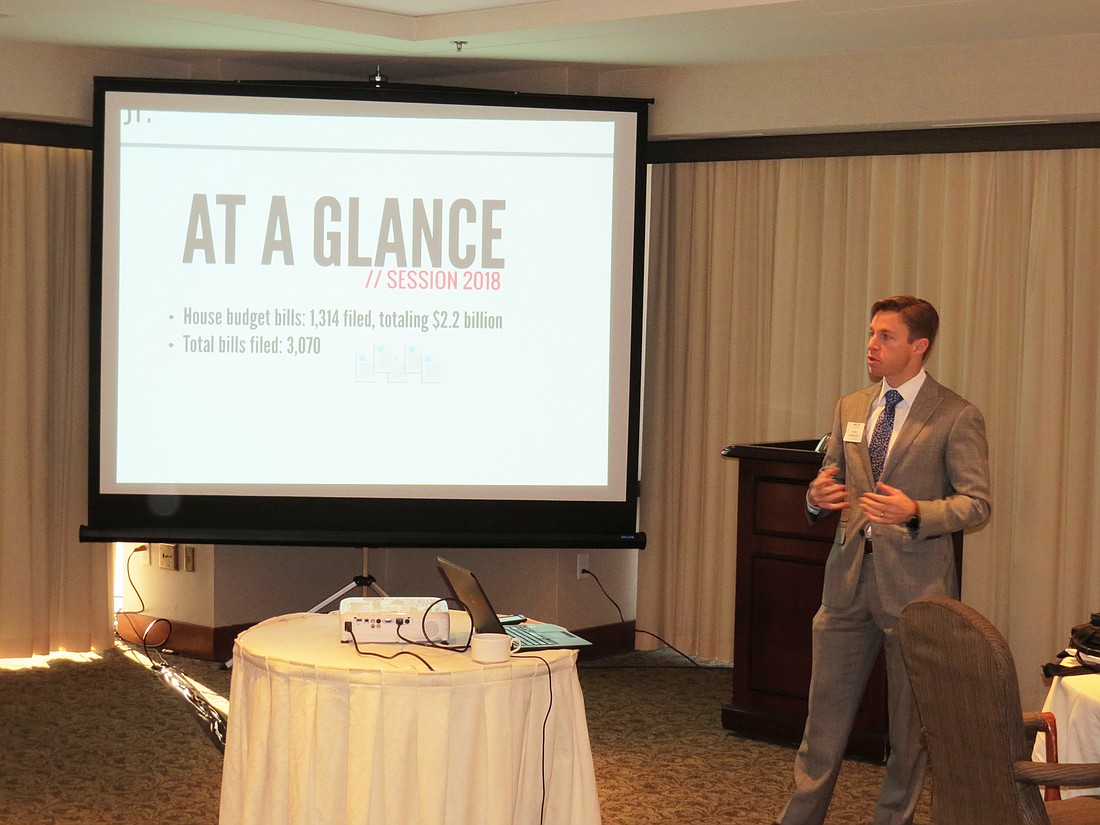
Six days down, 54 to go.
That was the concluding remark delivered to members of NAIOP Northeast Florida by Christopher Carmody, the statewide organization’s legislative lobbyist, at a breakfast Tuesday at The River Club.
Those 54 days promised to be eventful, based on his remarks, as the Florida Legislature continues its 60-day session.
Carmody, an attorney with GrayRobinson in Orlando, highlighted issues he expects to be addressed in Tallahassee over the coming weeks and how the absence of at least one powerful former state senator, Jack Latvala of Pinellas County, could impact key issues.
Latvala resigned in December following allegations of sexual misconduct, charges he denies. Without Latvala’s powerful influence, key health care and insurance legislation may find an easier path through the Senate, Carmody said.
Carmody said he is optimistic about issues such as development impact fees and business rent tax.
Health care
“This is going to be contentious,” Carmody said.
Every year, the House puts forth a bill to eliminate the certificates of need requirement for medical facilities. It requires hospitals demonstrate a public need to add hospital beds or build specialty facilities. The House has done so again this year with House Bill 27.
“Some people think it is a perfect system. The House clearly does not,” he said. “For the last couple of years, they have passed a bill that would get rid of the certificates of need system, but the Senate is where this usually went to die.”
The Grim Reaper, he said, was Latvala.
Similarly, the House has sent to the Senate bills to remove primary care agreements, essentially co-ops of doctors and patients, from the insurance code. This, too, has found past opposition in the Senate, also led by Latvala. The House is making another attempt this year with House Bill 37.
“Jack Latvala was that voice that blocked a lot of these House proposals,” Carmody said. “He was a big champion of the health care industry and of the insurance industry. Now he’s gone. … I would not be surprised if Speaker (Richard) Corcoran’s deft negotiation skills don’t get one or both of these things through.”
Tax increase supermajority
House Bill 7001 and Senate Bill 1742 would put on the ballot a constitutional amendment that would require a supermajority vote to increase taxes or fees at the state level.
“If you are going to do anything with a tax or fee or anything that expands the tax base it will require a supermajority of the vote, or three-fifths of the membership,” Carmody said. “If this gets on the ballot, I expect it to pass. I think Republicans are seeing some shifting winds and they might lose the majority of the House someday or it might become more even, and in their minds, having spoken to some of them, this will make it at least impossible for there to ever be a tax increase unless you truly have three-fifths of the body to get it through.
“I expect this to pass in both chambers,” he said.
Business rent tax
Florida is the only state to impose a tax on business leases, and until last year that rate was 6 percent. Following years of lobbying efforts by NAIOP and others, that rate was reduced to 5.8 percent in 2017. Carmody said that represented $78 million of last year’s $100 million tax cut.
The effort for further reduction continues in Tallahassee.
“We’re proud of what we did last year, especially in the Senate,” Carmody said. “The House has always been willing to pass the business rent tax reduction, but those of you who have been working hard on this issue know in the Senate every year it falls flat. Some of it is because of politics. Some of it is because it’s expensive.”
He said there still is an appetite for further reduction this year, even if it’s only 0.1 percent more.
“The goal has always been just to whittle away at it and in 10 years or so we can smile and say it’s gone,” Carmody said.
Impact fees
House Bill 697 and Senate Bill 324 would prohibit local governments from collecting impact fees prior to certificates of occupancy being issued. It also prohibits them from being applied to existing debt.
“I’ve heard a couple of you say you like to pre-pay these because you know the impact fees might go up later,” Carmody said. “That’s a fair point I think we need to educate some legislators about. Apparently, every school district in the state will tell you they are growing if you ask them, and a lot of them are, but this restricts new fees from paying an existing debt.”